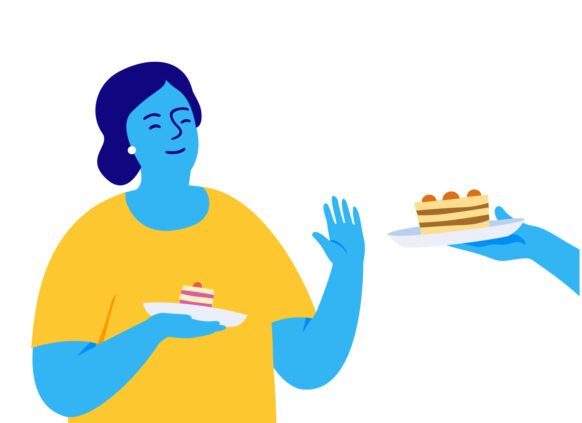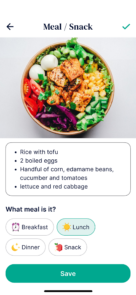
Foods to avoid when trying to lose weight: why it’s not that simple
Are you wondering about the foods to avoid when trying to lose weight? In general, it’s better to make sensible food choices and adopt a realistic approach to weight management so that you can sustain your diet long term. Diets with too much restriction are notoriously difficult to stick to.
At Oviva, our approach is not to exclude food groups but to make informed decisions and adopt a healthier lifestyle you can sustain long term. Our weight management service has helped over 1,000,000 people make healthier food choices and lose weight. Find out if you’re eligible.
Start your Oviva weight loss journey
Key Takeaways
- Rather than thinking about what foods to avoid when trying to lose weight, it’s better to have a sustainable approach to weight loss.
- Try to focus on healthy, nutritious foods and realistic substitutions or adjustments. This is easier than following strict rules about foods to say ‘no’ to.
- Lasting weight management success comes from behavioural changes you can sustain over time, not from too many restrictions or diets you can ‘fail’.
- Oviva can help you adopt healthy behaviours around nutrition and lifestyle while prioritising self-compassion and overall well-being.
It’s not about avoiding foods; it’s about smarter choices
It’s easy to think that weight loss means cutting out certain foods. Diet culture often talks about ‘good’ and ‘bad’ foods – or even entire food groups to avoid.
But here’s what the evidence shows:
-
Around 80–85% of people who lose weight through dieting alone regain it within a few years (Stanford Medicine).
-
A 2018 study (Hall & Kahan) found that most people see initial weight loss, followed by a plateau, and then weight regain.
-
The key to lasting change? Sustainable changes to diet, movement and mindset – not quick fixes.
At Oviva, we don’t tell you to cut out foods. Instead, we help you:
-
Understand your habits and make more mindful choices
-
Learn how to eat in a way that works for you long term
-
Feel more confident and supported – without harsh restrictions
If you’re ready to make lasting changes, we’re here to help.
NHS-funded support is available – you can get started today for free.
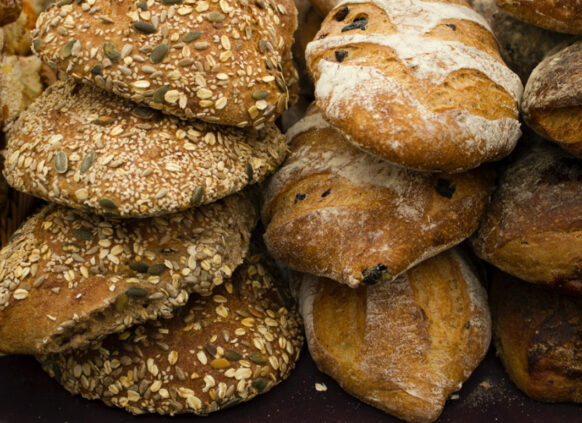
Why you should focus on the types of foods, not just cutting out
Rather than focusing on eliminating specific foods, it’s better to focus on eating a balanced diet made up of all the core macronutrients: protein, essential fats and carbohydrates. For example, brown rice is a nutritious, healthy carbohydrate packed with vitamins, minerals and fibre, while white bread is also a carbohydrate but is highly processed, low in fibre and causes a spike in blood sugar. It’s about making informed choices, not restricting entire food groups.
Some diets will tell you to get rid of an entire macronutrient group. However, your body needs essential nutrients from all of these groups. There are healthy and less healthy foods that belong to each of these groups. Eating a balanced diet with all of these food groups supports hormonal health, metabolism and overall well-being.
Carbohydrates
Carbohydrates are your body’s main source of energy. High-quality sources of carbohydrates include whole grains, vegetables, fruits, milk, beans and legumes – these have an array of health benefits.
Refined carbs are carbs that have been processed to remove the fibre content. This makes them less nutritious, and eating too many refined carbs can cause weight gain. Examples of refined carbs include white bread, white rice and white pasta.
Sugar is the simplest form of carbohydrate, and too much sugar can contribute to weight gain and various other health problems, including diabetes. Refined carbohydrates that contain a lot of sugar include sugary soft drinks, cakes, biscuits, sweets and chocolate.
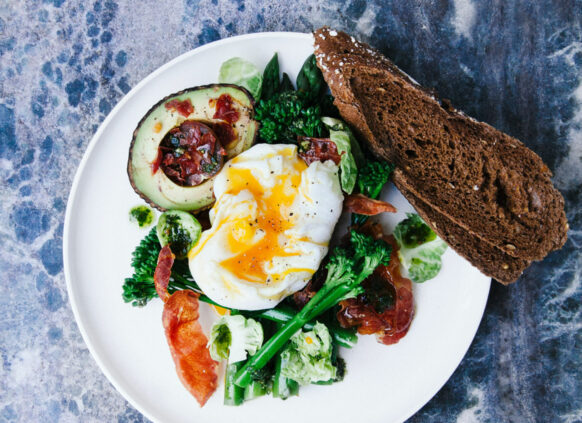
Fat
Fat also provides energy. However, healthy fats have additional roles, supplying fatty acids your body cannot make by itself and helping the body absorb vitamins. Healthy fats include monounsaturated fats (found in avocados, almonds and olive oil), omega-3 fats (found in salmon, sardines, other oily fish, walnuts and flaxseeds) and omega-6 fats (found in nuts and seeds).
It’s generally recommended to keep saturated fats and trans fats as low as you can. These less healthy fats are found in fatty cuts of meat, butter, pastry, chocolate and ice cream.
Protein
In addition to providing energy, protein plays a vital role in muscle growth and maintaining strength. It also helps with body functions like cell production and wound healing.
Eating lean, protein-rich foods is important, as this keeps your body healthy and minimises muscle loss while you lose weight.
Sources of lean protein include eggs, chicken, fish, tofu, nuts, seeds, peanut butter, lentils and beans. Some unhealthy proteins include processed meats like bacon, deli meat, and sausages, which can be high in saturated fat, sodium (salt) and preservatives.
Foods to avoid for sustainable weight loss
At Oviva, we believe that setting firm restrictions is not the best way to achieve long-term weight loss. Diets that prohibit foods are difficult to maintain over time, and this can cause frustration and feelings of shame if you “break the rules”. Research shows that balanced nutrition and learning to enjoy all food types while making healthier choices are the best ways to manage your weight.
For this reason, we don’t offer a strict list of foods to avoid when trying to lose weight. Instead, we focus on providing evidence-based information so you make healthy, sustainable choices.

Refined carbohydrates
It’s important to moderate your intake of refined carbs, as they can cause blood glucose spikes. Meals high in refined carbs may also stimulate the part of the brain associated with cravings and rewards, which can lead to overeating and weight gain or a weight loss plateau.
Examples of foods that are high in refined carbs include:
- White bread
- White rice
- White pasta
- Breakfast cereals that are not wholegrain versions
- Pizza dough
- Cakes and biscuits
- Pastries
Trans fats and highly processed fats
Fat is an essential part of your nutrition. Nevertheless, there are healthy sources of fat, like olive oil, nuts and seeds, and less healthy forms of fat, including trans fats and highly processed fats. Eating too much unhealthy fat can increase your risk of heart disease.
Examples of foods containing unhealthy fats include:
- Butter
- Chocolate
- Ice cream
- Fatty meats
- Cakes
- Biscuits
- Pastries
- Coconut oil

Sugary drinks
Sugary drinks offer little nutritional value and add unnecessary calories to your overall sugar intake. You should try to keep your sugar intake under control, as high sugar consumption is linked to weight gain and various other health risks.
Examples of drinks that are high in sugar include:
- Fizzy drinks (unless they are zero sugar variants)
- Fruit juices
- Sweetened tea or coffee
- Energy drinks
- Some alcohol-containing drinks, such as cocktails
Try alternatives, such as sugar-free flavoured water and unsweetened tea, when possible.
Fried foods
As a cooking method, frying adds unnecessary calories to your meals. Consider using alternative cooking methods whenever possible.
Examples of healthier cooking options include grilling and baking. You could eat a baked potato instead of fried chips and grill your bacon or poach your eggs.
Processed meats
Processed meats are high in salt, saturated fat and are associated with weight gain. Some studies have also linked processed meats with an increased cancer risk.
Examples of processed meats include:
- Sausages
- Ham and bacon
- Salami
- Corned beef
- Luncheon meats
It’s best to try to reduce your processed meat consumption and switch to lean protein sources as much as possible, including chicken, fish and plant-based options like tofu.
Artificial sweeteners
Research on artificial sweeteners is mixed, with some studies linking them to health conditions or suggesting that they don’t help with weight loss. However, further research is needed in this area. Whether to include artificial sweeteners is very much an individual choice, and for some people, they are a helpful alternative to sugary drinks.
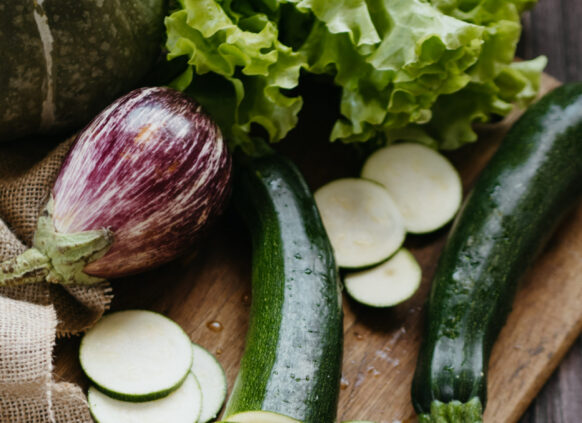
How to make sustainable changes in your meals
Rather than obsessing about what food to avoid when trying to lose weight, it’s better to think about sustainable changes you can make to your diet for the long term.
For example, you could eat whole grain bread instead of white bread, add more vegetables to your meals, or swap sugary drinks for sparkling water or flavoured water with no added sugar.
These simple substitutions can save you from eliminating entire food groups or going without foods you’re used to eating. Instead, you’re focusing on making healthier choices. Ultimately, this approach can help you to lose weight sustainably and successfully.
You don’t need to avoid all the foods you like, but try to emphasise nutritious meals and a balanced diet. This will allow you to get all the nutrients you need.
If you’re unsure what a balanced diet looks like, follow a healthy diet plan for a week or two. Then, you can add some of your favourite meals from the plan to your regular diet.
Some good examples include porridge with a small handful of blueberries for breakfast, falafel and salad pitta for lunch, and spaghetti bolognese using whole grain spaghetti for dinner. These meals all provide a mix of essential nutrients.
Oviva patient success stories:

 -22kg
-22kg
Heidi (53)

 -25kg
-25kg
Martin (34)

 -32kg
-32kg
Patricia (53)
Beyond avoiding foods: the importance of behaviour change
You need to think beyond ideas like foods to avoid when you’re trying to lose weight and contemplate broader changes to your lifestyle. The key to successful weight management is adopting positive behaviours that can form healthy habits you can rely on indefinitely.
It’s much easier to choose healthy snacks as much as possible and make balanced, nutritious meals than to adopt a crash diet or tell yourself to stop eating your favourite foods. Making extreme changes is a recipe for burnout and returning to old habits.
The focus should always be on moderation and gradual, realistic change.
You should also think about other lifestyle factors beyond diet, such as moving around more and getting some exercise. This can also begin with simple, sustainable changes, like using the stairs instead of the lift at work or going for a short walk daily.
Remember, those small, sustainable changes can all add up to big wins in the long run, and they are things that you can continue to do. Be kind to yourself as you make these changes, take time to celebrate the small victories and don’t beat yourself up over occasional indulgences.
At Oviva, we work with you to set realistic goals that prioritise support and self-compassion – never shame. Personal progress, no matter how small, is something to be celebrated on our programme.

Embrace sustainable, balanced eating for long-term success
We don’t believe in banning foods or eliminating entire food groups from your diet. Evidence shows this kind of drastic change is likely to cause burnout and a return to old habits, ultimately resulting in a loss of progress.
With Oviva, you can learn to adopt a balanced diet and a healthy lifestyle with support from a team of healthcare professionals, including dietitians and psychologists. You’ll have access to personalised care and coaching and can track your progress on the Oviva app.
Our approach is focused on impactful, meaningful and realistic steps to optimise your health. We can also offer prescription weight loss medication, further assisting with weight loss.
Eligibility is based on your location in England. Additional eligibility criteria include:
- 18+ years of age.
- A BMI over 35* with relevant comorbidities.
* For people from ethnic minority family backgrounds, this minimum BMI is reduced.
